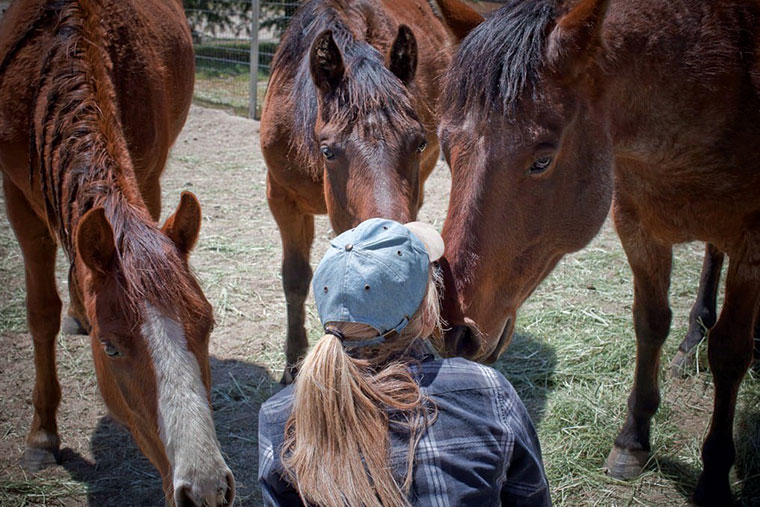By Sheryl Lynde | Horsetrader columnist

Years ago, I purchased my first mare, Missy. We got along really well as I tested her out at her previous owner’s place. However when I brought her home, she became aggressive.
As I entered her pen the next day, she pinned her ears, bared her teeth and charged me. This was such a departure from her behavior while at the owner’s place. I never felt that I had been misled – I just thought the behavior was due to the change in her environment. I needed to establish my authority, not necessarily for disciplinary action, but in order to create a familiar hierarchy that made sense to her and restored order.
She taught me how to be a good leader — not a leader to be feared, but one she needed and would follow. We made a good team. Some years later, I was riding through an equestrian community and a couple was riding toward me. I gave them a wide path. Missy was intolerant of horses that invaded her space. She would squeal a high-pitched warning and then strike, all before you knew what happened. As the couple rode past, the gal gave my mare a good looking-over.
She asked if my mare’s name was Missy.
I stopped and answered, “yes!” She called to her husband, confirming it was Missy. He turned and came charging toward us. I started to back up and warn him of her behavior, but he was undeterred. He explained his gelding helped raise Missy when she was weaned from her dam. They were inseparable companions at their facility. And, just like that, my mare nestled her face into the crook of his gelding’s neck, and neither of them moved for the entirety of our visit.
This couple were the original breeders, and they had sold Missy when she was two. Now 10, my mare hadn’t seen this gelding for eight years, but she clearly remembered him. Missy had the capacity to create strong bonds with both people and former companions. Her aggression toward me when I first brought her home was a symptom; the cause was separation anxiety from the life and companions that had been familiar to her.
In order for a correction to be an appropriate response to disobedience, it needs to be determined if the disobedience is (a) a symptom of their nature, or (b) a circumstance. Aggression toward me was not in Missy’s nature. A change in the horse’s life can be the catalyst for unwanted behavior and is solely exhibited as a defense mechanism meant to get some level of control back over their world that has just been rocked. As new owners, we need to be cognizant of this. Providing effective, consistent leadership or authority is usually the remedy for behavioral issues stemming from a change in their circumstances. When a correction is given in the absence of a specific purpose, it will lose its legitimacy and will not provide the result you may be hoping for.
So, be aware of all the possibilities behind any aberrant behavior. Horses need time and patience to adjust to their new surroundings and to recover from the loss of past companions.
Years ago, a newly purchased Arab was sent to me for issues relating to fear. Once in training, he quickly left behind his reactive behavior and offered abilities that his owner was unaware he possessed. He inhabited his body with a fluidity and grace that was effortless. He read my thoughts and was beyond light. I felt his joy, his sense of freedom, and I was filled with gratitude for the experience — truly moments I won’t forget. He would walk beside me without a halter. Trust is built from consistent leadership that is offered with the same temperament today as it will be tomorrow and as it was yesterday. Once he shed his fearful behavior, he was able to fully actualize his skills and abilities. Arabs bond with people; it’s in their DNA. Their ancestors were raised in the tents of their handlers creating formidable liaisons.
The only missing link in the owners relationship was the lack of an established authority or leadership. Provide that consistently, and the relationship will thrive My goal as a trainer is to ensure each horse I train or own has a bright future, that if anything happens to me, anyone would be pleased to own any of my horses. I instill manners and expose them to a variety of conditions and environments. That being said, if circumstances do change and they find themselves being separated from their companions and in a new home, they would still need time to adjust. I pray that anyone lucky enough to have them will honor the time it takes.
–Sheryl
Leave a Comment
All fields must be filled in to leave a message.